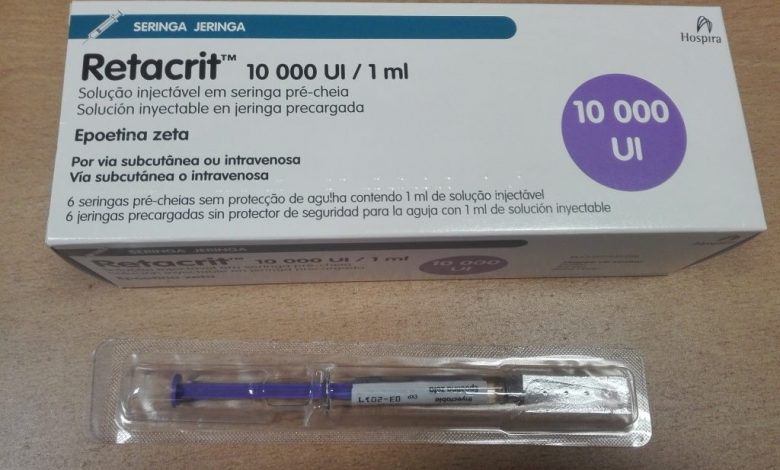How Long Can You Take Retacrit?

Retacrit is a ‘biosimilar’ medication produced by Pfizer for the treatment of anemia (low red blood cell count) in people with long-term serious kidney disease (chronic kidney failure), people receiving zidovudine to treat HIV, and people receiving chemotherapy for some types of cancer (cancer that does not involve the bone marrow or blood cells).
It may also be used in anemic patients to reduce the need for blood transfusions before certain planned surgeries that have a high risk of blood loss (usually given with an anticoagulant/”blood thinner” medication such as warfarin to lower the risk of serious blood clots).
It is available in prefilled syringes containing between 1,000 and 40,000 international units (IU) of the active substance, epoetin zeta.
How does Retacrit work?
A hormone called erythropoietin stimulates the production of red blood cells from the bone marrow. Erythropoietin is produced by the kidneys. In patients receiving chemotherapy or with kidney problems, anemia can be caused by a lack of erythropoietin, or by the body not responding enough to the erythropoietin it has naturally. In these cases, erythropoietin is used to replace the missing hormone or to increase red-blood-cell counts. Erythropoietin is also used before surgery to increase the number of red blood cells to help patients produce more blood for self-donation.
How long can you take Retacrit?
In general, the dose, the frequency of injection, and how long Retacrit is used depend on why it is being used and are adjusted according to the patient’s response.
- For injection dosage form:
- For anemia from chemotherapy:
- Adults—Dose is based on body weight and must be determined by your doctor. The starting dose is 150 units per kilogram (kg) injected under the skin three times a week or 40,000 units injected under the skin once a week. Your doctor may adjust the dose as needed.
- Children 5 years of age and older—Dose is based on body weight and must be determined by your doctor. The starting dose is 600 units per kg injected into a vein once a week. Your doctor may adjust the dose as needed.
- Children younger than 5 years of age—Use and dose must be determined by your doctor.
- For anemia from chronic kidney failure on dialysis:
- Adults—Dose is based on body weight and must be determined by your doctor. The starting dose is 50 to 100 units per kilogram (kg) injected into a vein or under the skin three times a week. Your doctor may adjust the dose as needed.
- Children 1 month to 16 years of age—Dose is based on body weight and must be determined by your doctor. The starting dose is 50 units per kg injected into a vein or under the skin three times a week. Your doctor may adjust the dose as needed.
- Children younger than 1 month of age—Use and dose must be determined by your doctor.
- For anemia from chronic kidney failure not on dialysis:
- Adults—Dose is based on body weight and must be determined by your doctor. The starting dose is 50 to 100 units per kilogram (kg) injected into a vein or under the skin three times a week. Your doctor may adjust the dose as needed.
- Children—Use and dose must be determined by your doctor.
- For anemia from HIV therapy:
- Adults—Dose is based on body weight and must be determined by your doctor. The starting dose is 100 units per kilogram (kg) injected into a vein or under the skin three times a week for 8 weeks. Your doctor may adjust the dose as needed.
- Children—Use and dose must be determined by your doctor.
- For anemia from surgery:
- Adults—Dose is based on body weight and must be determined by your doctor. The starting dose is 300 units per kilogram (kg) injected under the skin for 10 days before the surgery, on the day of the surgery, and for 4 days after surgery.
- Children—Use and dose must be determined by your doctor.
- For anemia from chemotherapy:
For patients with kidney problems, Retacrit can be injected into a vein or under the skin. For patients receiving chemotherapy, it must be injected under the skin, and for patients about to undergo surgery, it must be injected into a vein.
Does Retacrit make you tired?
Yes, Retacrit can cause unusual tiredness and fatigue which can make it hard to get out of bed in the morning and prevent a person from fulfilling their daily tasks. Increased Retacrit fatigue that lasts longer than 2 weeks might require a visit to a doctor. A visit to a doctor usually is needed when fatigue occurs along with more serious symptoms, such as increased breathing problems, signs of a serious illness, abnormal bleeding, or unexplained weight loss or gain.
What are the other side effects of Retacrit?
Common side effects may include:
- blood vessel blockage;
- depressed mood;
- fever, chills, cough, feeling short of breath;
- headache, dizziness;
- high blood sugar;
- itching or rash;
- joint pain, bone pain, muscle pain or spasm;
- low potassium, low white blood cells;
- mouth pain, trouble swallowing;
- nausea, vomiting;
- pain or redness where the medicine was injected.
- trouble sleeping;
- weight loss;
This is not a complete list of side effects and others may occur. Call your doctor for medical advice about side effects. You may report side effects to FDA at 1-800-FDA-1088.





